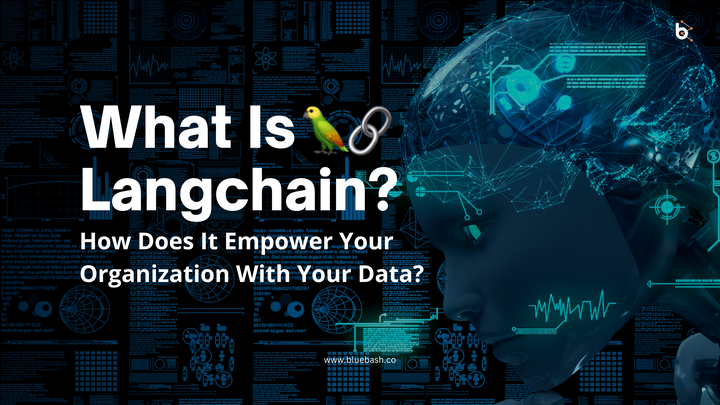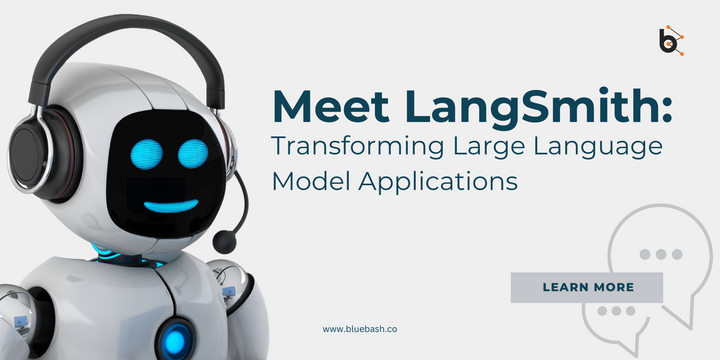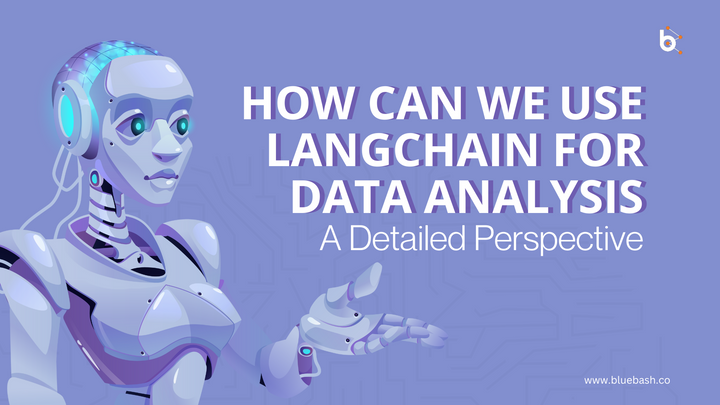How Are AI Agents Transforming Surgical Planning, Execution, and Post-Op Monitoring?
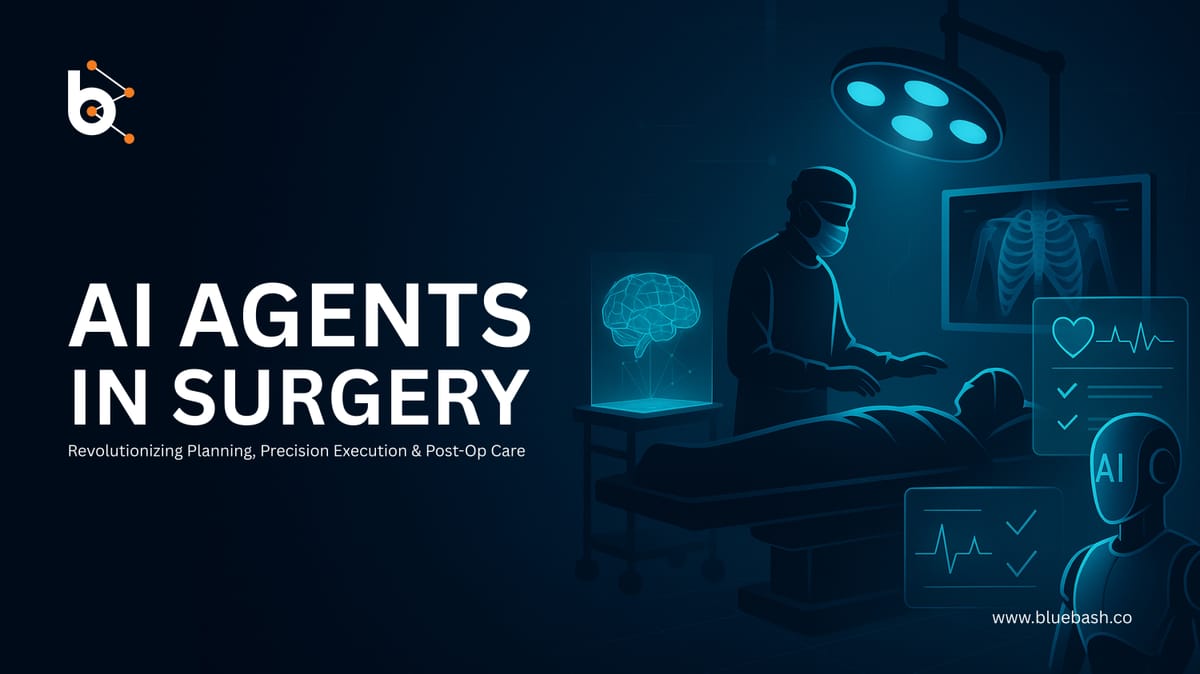
Surgery has always represented the pinnacle of medical science—where human skill, precision, and technology converge to save lives. But as we step into 2026, the operating room is no longer defined solely by scalpels, surgical lights, and steady hands. A new era is unfolding, powered by AI agents for surgical assistance.
From pre-operative planning to intraoperative execution to post-operative care, intelligent AI-driven systems are becoming indispensable partners for surgeons. The big question many in healthcare are asking is: how are AI agents transforming surgery in 2026? Let’s explore how these technologies are revolutionizing each phase of the surgical journey.
The Rise of AI Agents in Surgical Care
The introduction of AI agent development services has enabled hospitals and research centers to design AI-powered assistants tailored for specific surgical needs. Unlike static software tools, AI agents continuously learn, adapt, and collaborate with human surgeons.
Where once surgeons relied on manual scans, fragmented reports, and personal expertise, they now have AI-driven surgical assistants that process vast datasets, anticipate complications, and deliver real-time insights. This shift is not about replacing human intelligence, but rather about enhancing it—making surgery safer, faster, and more precise.
Smarter Surgical Planning: Laying the Foundation
- Personalized, Data-Driven Blueprints
Every surgery begins with planning, and here, AI agents for surgical planning are making the most dramatic difference. By analyzing patient imaging—like MRI and CT scans—AI systems construct highly detailed 3D models of anatomy. These models allow surgeons to explore different surgical routes, identify risks, and predict recovery outcomes before a single incision is made.
This level of personalization ensures that each procedure is adapted to the unique physiology of the patient, minimizing guesswork and uncertainty. - Speed and Efficiency
Traditionally, preparing a surgical plan could take hours or even days. With AI, the process is accelerated significantly. AI agents for surgical planning can analyze thousands of prior cases, highlight the most effective strategies, and generate an optimized plan in minutes. This means more patients can receive care faster, reducing backlogs in surgical departments. - Reducing Human Error
Even the most skilled surgeons can face limitations when interpreting complex data. AI systems identify subtle patterns invisible to the human eye—such as micro-abnormalities in tissues—that could influence surgical outcomes. By surfacing these insights early, they help surgeons avoid potential errors.
AI Agents for Surgical Assistance: Transforming the Operating Room
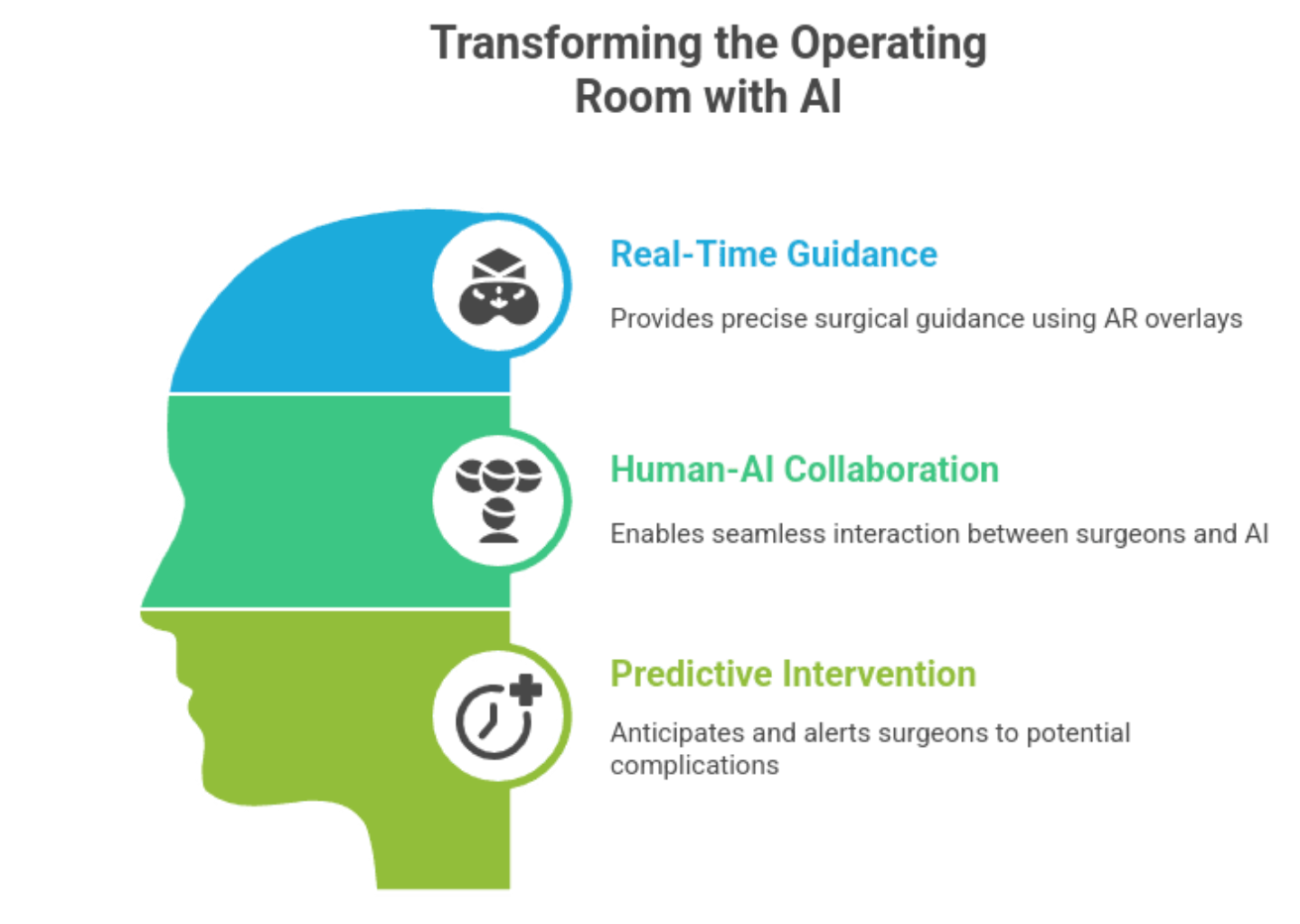
- Real-Time Guidance
Inside the operating room, AI agents for surgical assistance act as intelligent co-pilots. Using augmented reality overlays, they can guide a surgeon’s hand with millimeter-level precision. For example, when placing implants or navigating delicate neural pathways, the AI ensures accuracy that surpasses human ability alone. - Human-AI Collaboration
What makes modern AI-driven surgical assistants so powerful is their ability to collaborate naturally with surgeons. Through voice commands, surgeons can ask the AI to zoom into a specific anatomical region, highlight a structure, or suggest the next procedural step. The result is a seamless blend of human intuition and machine intelligence. - Predictive Intervention
During surgery, conditions can change rapidly. AI agents continuously analyze vital signs, imaging feeds, and environmental factors to anticipate complications before they occur. If blood loss is increasing or tissue behavior indicates an emerging risk, the AI can alert the surgeon in real-time, enabling faster interventions and improved patient safety.
Beyond the Operation: AI Agents for Post-Operative Monitoring
- Continuous, Remote Care
The story doesn’t end once the operation is over. In fact, recovery is often where complications arise. AI agents for post-operative monitoring play a critical role here. Using wearable devices and connected sensors, they track patients’ vital signs, movement, and adherence to medication schedules.
These agents communicate directly with healthcare providers if anomalies are detected—such as early signs of infection or irregular heart rhythms—ensuring intervention happens before problems escalate. - Patient Engagement and Support
For patients, recovery can feel isolating. Conversational AI-driven surgical assistants act as virtual companions, reminding them to take medications, guiding them through physiotherapy exercises, or answering common post-surgery questions. This support not only reduces anxiety but also increases adherence to recovery plans. - Smarter Documentation
Another pain point in surgery is documentation. AI agents now auto-generate post-op reports by analyzing procedure videos and clinical data, freeing surgeons from tedious paperwork and ensuring more accurate records for future reference.
The Bigger Picture: How Are AI Agents Transforming Surgery in 2026?
By 2026, the adoption of AI in surgical care is no longer experimental—it’s becoming standard practice. Hospitals that integrate AI agent development services into their surgical systems report:
- Higher success rates due to predictive planning and real-time precision.
- Reduced costs as surgeries become shorter, recovery times faster, and complications fewer.
- Better patient experiences, with personalized monitoring and round-the-clock AI support.
Surgeons themselves are adapting, too. Training programs now include modules on working alongside AI assistants, teaching future doctors how to interpret AI insights and maintain control while leveraging machine intelligence.
Importantly, these technologies are designed around a human-in-the-loop model. AI agents assist, but decisions always remain in the surgeon’s hands. This balance preserves accountability while unlocking the potential of automation.
Challenges and Ethical Considerations
As with any disruptive innovation, challenges remain. Questions about liability, data privacy, and algorithmic transparency continue to surface. If an AI-driven recommendation leads to an error, who is responsible—the surgeon, the software, or the hospital?
To address this, governments and medical boards are developing stricter regulations for surgical AI tools, ensuring they meet rigorous safety and ethical standards. Trust will be a cornerstone of successful adoption, requiring both patients and providers to feel confident in these systems.
Why Choose Bluebash for AI-Powered Surgical Assistance Solutions?
At Bluebash, we specialize in building AI agent development services that bring intelligence, safety, and efficiency to surgical care. Here’s why healthcare providers trust us:
- Deep Domain Expertise – We understand surgical workflows and healthcare regulations, ensuring solutions that are both innovative and compliant.
- Customized AI Development – Our AI-driven surgical assistant tools are tailored to fit seamlessly into your hospital’s unique systems.
- Human-Centered Design – We build intuitive AI agents that enhance, not replace, the surgeon’s role through human-in-the-loop collaboration.
- Regulatory & Security Compliance – Every solution follows HIPAA, GDPR, and strict data security standards for safe implementation.
- Continuous Innovation – We keep your surgical teams ahead with evolving AI solutions that adapt to new technologies and needs.

Conclusion: The Future of AI in Surgery
The future of surgery is being reshaped by AI agents for surgical planning, assistance, and post-operative monitoring. From smarter pre-op blueprints to real-time intraoperative guidance and proactive recovery support, AI-driven surgical assistants are transforming patient outcomes and surgical efficiency alike.
As adoption accelerates in 2026, hospitals and surgical teams will need trusted partners to bring these innovations to life. Bluebash stands at the forefront, delivering tailored AI agent development services that ensure safety, compliance, and innovation at every step. The question is no longer if AI will redefine surgery—it’s who you trust to guide you there.
FAQ's
- What are AI agents for surgical planning?
AI agents for surgical planning use advanced imaging, 3D modeling, and predictive analytics to create personalized surgical blueprints, helping surgeons reduce risks and optimize outcomes. - How do AI agents assist during surgery?
AI agents for surgical assistance provide real-time guidance, augmented reality overlays, and predictive alerts, acting as intelligent co-pilots to improve precision and patient safety. - What role do AI agents play in post-operative monitoring?
AI agents for post-operative monitoring track patient vitals, detect early signs of complications, and engage patients with reminders and recovery support, ensuring faster and safer recovery. - Will AI replace surgeons in the future?
No, AI agents are designed to enhance—not replace—surgeons. They follow a human-in-the-loop approach, where the surgeon remains in full control while AI provides critical insights. - Why should hospitals adopt AI agent development services now?
Adopting AI-driven surgical assistants in 2026 helps hospitals improve success rates, reduce costs, enhance patient care, and stay ahead in the rapidly evolving healthcare landscape.

